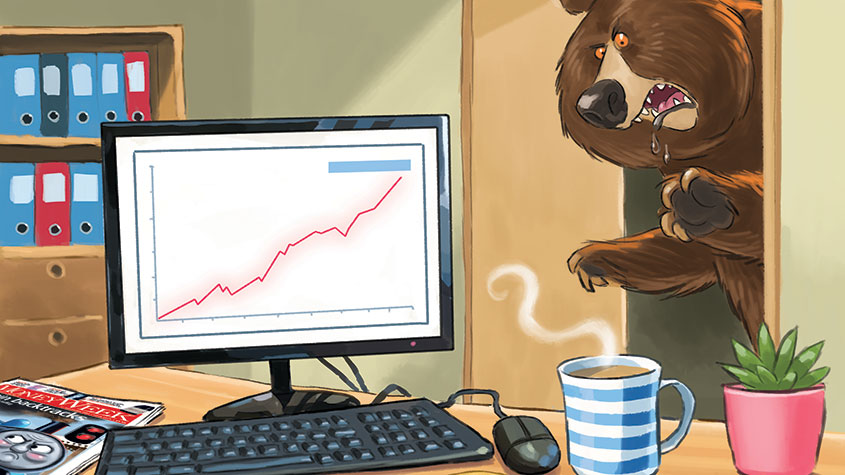The bottom of the commodities barrel
We might be nearing the bottom of the market in commodities, says Merryn Somerset Webb. But that doesn't necessarily mean you should pile in.

Get the latest financial news, insights and expert analysis from our award-winning MoneyWeek team, to help you understand what really matters when it comes to your finances.
You are now subscribed
Your newsletter sign-up was successful
Want to add more newsletters?

Twice daily
MoneyWeek
Get the latest financial news, insights and expert analysis from our award-winning MoneyWeek team, to help you understand what really matters when it comes to your finances.

Four times a week
Look After My Bills
Sign up to our free money-saving newsletter, filled with the latest news and expert advice to help you find the best tips and deals for managing your bills. Start saving today!
When investors look back to 2015 you might think they'd remember it for one thing and one thing alone: the collapse in commodity prices. Over the last year, pretty much all prices (bar those of some agricultural commodities) have fallen sharply with oil leading the way. It's just hit a six-year low.
We discussed what's happened in these markets in our cover story on gold miners last week, but it's pretty straightforward. When Chinese demand really kicked off at the start of the century, prices soared. Huge amounts of capital poured into increasing commodity production (ie, lots of firms dug lots of new holes in the ground and dug stuff out). Then just as supply was growing fast, crisis hit, China slowed and super-boom turned to super-bust.
That's hit resources stocks now dragging down indices worldwide. It's hit the currencies of all the countries dependent on commodity exports. It's given the corporate bond market a bit of a turn: according to Ed Yardeni of Yardeni Research, just under 20% of high-yield corporate bonds are attached to energy firms. And it's starting to affect dividend payouts in the UK: Anglo American is to get rid of some 60% of its staff, over half its assets and (for now at least) its dividend. That's nasty and given that payouts from resource firms make up a hefty percentage of the overall UK market yield, it's pretty worrying for income investors too.
MoneyWeek
Subscribe to MoneyWeek today and get your first six magazine issues absolutely FREE

Sign up to Money Morning
Don't miss the latest investment and personal finances news, market analysis, plus money-saving tips with our free twice-daily newsletter
Don't miss the latest investment and personal finances news, market analysis, plus money-saving tips with our free twice-daily newsletter
Normally we might look at a misery list like this and wonder if it is time to start buying every commodity stock in sight. When a firm like Anglo capitulates so dramatically, it makes sense to think as Jonathan Allum puts it in his Blah! newsletter that we might be "within spitting distance of a market bottom". The problem is that market bottoms can last a long time (I've just done two interesting video interviews on this with Charlie Morris, new editor of the Fleet Street Letter, and Edward Chancellor watch out for those) and this one looks like it might last a bit longer.
Why? Yardeni again: "Rather than responding to falling prices by cutting production, many commodity producers are increasing their output... in a vain attempt to bolster their revenues so they can meet their debt-servicing obligations." Doesn't sound good does it? Expect more dividend cuts.
This doesn't help the already ugly picture for anyone looking for income from their portfolio. And I'm afraid to say that our cover story doesn't either.A good many of our readers have long looked to buy-to-let to provide them with a stable retirement income. That might still work for those buying in cash, but for those buying with a mortgage it probably won't. This week, I look at the effects of the new tax regime around property investment. Add them up and you might join us in thinking that, when investors look back on 2015, they'll remember it more for the carnage in the buy-to-let market than anything else.
Get the latest financial news, insights and expert analysis from our award-winning MoneyWeek team, to help you understand what really matters when it comes to your finances.

-
 Early signs of the AI apocalypse?
Early signs of the AI apocalypse?Uncertainty is rife as investors question what the impact of AI will be.
-
 Reach for the stars to boost Britain's space industry
Reach for the stars to boost Britain's space industryopinion We can’t afford to neglect Britain's space industry. Unfortunately, the government is taking completely the wrong approach, says Matthew Lynn
-
 These 2 stocks are set to soar
These 2 stocks are set to soarTips The returns from these two aluminium and tin stocks could be spectacular when the commodity cycle turns says David J Stevenson.
-
 What to do as the age of cheap money and overpriced equities ends
What to do as the age of cheap money and overpriced equities endsEditor's letter The age of cheap money, overpriced equities and negative interest rates is over. The great bond bull market is over. All this means you will be losing money, says Merryn Somerset Webb. What can you do to protect yourself?
-
 The best ways to buy strategic metals
The best ways to buy strategic metalsTips Weaker prices for strategic metals in the alternative-energy sector are an investment opportunity, says David Stevenson. Here, he picks some of the best ways to buy in.
-
 A lesson for investors from a ill-fated silver mine
A lesson for investors from a ill-fated silver mineAnalysis Mining methods may have changed since the industry’s early days, but the business hasn’t – digging ore from the ground and selling it at a profit. The trouble is, says Dominic Frisby, the scams haven't changed either.
-
 Investors are bullish – but be very careful
Investors are bullish – but be very carefulEditor's letter Many investors are buying the dip, convinced the latest upswing is the start of a new bull market. The odds are that it’s not, says Andrew Van Sickle. The bear has unfinished business.
-
The MoneyWeek approach to investing
Editor's letter At MoneyWeek, our aim is simple: to give you intelligent and enjoyable commentary on the most important financial stories, and tell you how to profit from them. So how do we do that?
-
 Celebrity bitcoin ads echo the subprime mortgage crisis
Celebrity bitcoin ads echo the subprime mortgage crisisEditor's letter A wave of ads featuring celebrities punting crypto to the masses are reminiscent of how low income Americans were encouraged to take on loans they couldn’t afford, says Merryn Somerset Webb.
-
 The natural resources industry is in a tight spot – which is bad news for the rest of us
The natural resources industry is in a tight spot – which is bad news for the rest of usOpinion The natural resources industry is in a bind. We need it to produce more energy and metals, but it has been starved of investment, plagued by supply chain issues, and hobbled by red tape. That’s bad news for everyone, says Dominic Frisby.